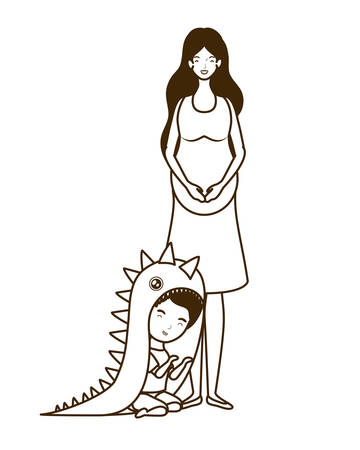Understanding Postnatal Depression in the UK Context
Postnatal depression (PND) is a significant mental health condition that affects many new mothers and, by extension, their families across the United Kingdom. Unlike the transient “baby blues,” which typically resolve within two weeks after childbirth, postnatal depression can persist for months or even years if left untreated. In the UK, it is estimated that around one in ten women will experience PND after giving birth, though this number may be higher due to underreporting and stigma associated with mental health issues.
Awareness of postnatal depression has grown over recent years, thanks to public health campaigns and increasing openness about mental health in British society. However, there remain cultural attitudes and misconceptions that can make it difficult for affected individuals to seek help. Some still view postnatal depression as a personal weakness or something to be kept private, which can delay diagnosis and intervention. Furthermore, certain groups—including fathers and partners—may not recognise symptoms in themselves or feel comfortable discussing their struggles.
Within the context of the UK’s diverse communities, cultural background can also shape how postnatal depression is perceived and addressed. For example, some ethnic minority groups may face additional barriers to accessing support due to language differences, social stigma, or lack of culturally sensitive services. This underscores the importance of understanding PND not only as a medical condition but also within the framework of societal attitudes and local healthcare practices across Britain.
Recognising these challenges is the first step towards improving outcomes for families affected by postnatal depression. With greater awareness and open conversation, UK families can better identify symptoms early and access timely professional support—ultimately reducing the risk of long-term consequences associated with untreated PND.
2. Why Some Postnatal Depression Goes Untreated
Despite growing awareness of postnatal depression (PND), many cases remain undiagnosed or untreated within the UK, resulting in long-term consequences for mothers, infants, and families. Several unique barriers contribute to this issue, including specific challenges faced by British families in accessing mental health support through the NHS, persistent stigma around mental illness, and distinct differences in healthcare provision between urban and rural communities.
NHS Access and Resource Limitations
The National Health Service (NHS) is renowned for providing universal healthcare. However, constraints such as staff shortages, long waiting times for mental health services, and regional variability can hinder timely intervention for PND. For instance, some women may face several weeks’ wait for a mental health referral after raising concerns with their GP or health visitor. This delay can exacerbate symptoms and reduce the likelihood of seeking further help.
Barriers to Accessing NHS Services
| Barrier | Description | Impact on Families |
|---|---|---|
| Long Waiting Times | Delays in accessing specialist perinatal mental health teams or talking therapies. | Prolonged suffering, increased risk of chronic depression. |
| Staff Shortages | Lack of trained professionals in certain regions. | Reduced follow-up care; inconsistent support. |
| Regional Disparities | Uneven distribution of services between urban and rural areas. | Inequitable care; rural families may be underserved. |
Stigma Surrounding Mental Health in the UK
Mental health stigma remains a significant obstacle across the UK. Many new mothers fear being judged as unfit parents or worry about potential involvement from social services if they disclose depressive symptoms. Cultural expectations to ‘get on with it’ or not ‘make a fuss’ can deter open discussions about emotional wellbeing. This reluctance is often more pronounced among certain ethnic minority groups due to additional cultural pressures or language barriers.
Urban-Rural Healthcare Differences
Rural families often face additional hurdles in accessing mental health support compared to those living in cities. Limited public transport options, fewer local NHS resources, and social isolation can make it more challenging for rural mothers to attend appointments or find supportive networks. In contrast, while urban areas generally offer more resources, high demand can still lead to overstretched services and impersonal care experiences.
Key Takeaway for UK Families
Awareness of these unique barriers is crucial for British families. Recognising the factors that may prevent timely diagnosis and treatment allows families to seek alternative support early—whether through community groups, online forums, or private counselling—while continuing to advocate for improvements within the NHS system.

3. Long-term Health Consequences for Mothers
When postnatal depression remains untreated, the long-term health consequences for mothers in the UK can be profound and multifaceted. Physically, women may experience chronic fatigue, sleep disturbances, and a greater susceptibility to developing other medical conditions such as cardiovascular disease and diabetes. These issues often stem from ongoing stress and neglect of personal health routines, which are common when depressive symptoms are left unaddressed.
Psychologically, untreated postnatal depression can lead to persistent low mood, anxiety disorders, and even the development of more severe mental health conditions like chronic depression or post-traumatic stress disorder (PTSD). Cognitive function may also be affected, with difficulties in concentration, memory lapses, and impaired decision-making becoming more apparent over time.
Furthermore, the social implications should not be underestimated. Many women report feelings of isolation and a reduced ability to form meaningful connections with friends and family. The stigma associated with mental health issues in some UK communities can exacerbate these feelings, making it harder for mothers to seek help or discuss their struggles openly.
Without timely care and support from healthcare professionals such as GPs, midwives, or mental health specialists within the NHS framework, these physical and psychological effects can become entrenched. Early intervention is essential not only for symptom relief but also for preventing long-term complications that can significantly diminish a woman’s quality of life.
Impact on Child Development and Family Dynamics
Untreated postnatal depression (PND) can significantly influence both child development and the overall dynamics within UK families. The early years of a childs life are crucial for their emotional, cognitive, and social growth. When a parent is struggling with PND, these foundational stages can be disrupted, potentially leading to long-term consequences for the infant’s health and wellbeing.
Infant Health and Emotional Bonds
One of the most concerning effects of untreated PND is its impact on the parent-infant bond. This relationship forms the basis for secure attachment, which is vital for healthy emotional development. In the UK, research has shown that babies whose mothers experience prolonged depression may exhibit increased irritability, feeding difficulties, and problems with sleep regulation. Furthermore, these infants might later show delays in language acquisition and reduced social engagement.
| Area Affected | Potential Impact |
|---|---|
| Emotional Attachment | Insecure bonding, increased anxiety in children |
| Cognitive Development | Delayed milestones in speech and problem-solving skills |
| Physical Health | Poor weight gain, sleep disturbances |
Wider Family Wellbeing
The influence of untreated postnatal depression extends beyond the mother-child relationship. Partners often report increased stress levels, feelings of helplessness, and strain on their own mental health. Siblings within the household may also notice changes in attention and care from parents, leading to behavioural issues or emotional distress. Over time, these factors can disrupt family routines and negatively affect overall family harmony.
Common Family Challenges Associated with Untreated PND
- Diminished family communication and increased conflict
- Reduced participation in social activities or community support networks
- Financial pressures due to decreased parental functioning or work absence
The Importance of Early Intervention in the UK Context
NHS guidelines emphasise early identification and intervention for postnatal depression to protect both children’s development and family stability. Support services—such as health visitor assessments, talking therapies, and peer support groups—play a critical role in mitigating the adverse impacts outlined above. Prompt recognition and treatment are essential steps towards fostering healthier outcomes for both children and their families across the UK.
5. Recognising the Signs: What UK Families Can Look For
Identifying postnatal depression (PND) early is crucial for preventing its long-term effects, both for mothers and their families. In the UK, where awareness and understanding of mental health are steadily improving, families can take practical steps to spot warning signs and seek support promptly.
Common Symptoms to Watch Out For
While some mood changes are normal after childbirth, persistent symptoms may indicate PND. British families should look out for:
- Continuous low mood, sadness, or tearfulness lasting more than two weeks
- Withdrawal from social activities or reluctance to attend local parent groups
- Irritability, anxiety, or unexplained anger towards loved ones
- Trouble bonding with the baby or feeling detached
- Excessive tiredness or insomnia unrelated to infant care
- Lack of interest in self-care or daily routines
The Role of Partners and Family Members
Family members often notice subtle changes before the mother does. In the UK, partners, grandparents, and close friends should feel empowered to gently ask about emotional wellbeing. Expressing concern in a non-judgemental way—such as saying “You don’t seem yourself lately, would you like to talk?”—can make a significant difference.
Navigating the NHS and Community Resources
If you’re worried about a loved one, encourage her to speak with her GP or health visitor. The NHS offers confidential advice and support through local surgeries and children’s centres across England, Scotland, Wales, and Northern Ireland. Many areas also provide drop-in clinics or support groups run by charities like Mind and PANDAS Foundation UK.
When to Seek Immediate Help
If there are signs of suicidal thoughts, self-harm, or concerns for the baby’s safety, contact your GP urgently or call NHS 111 for guidance. In an emergency, dial 999. Early intervention can prevent escalation and promote recovery.
By staying attentive to these signs and utilising British healthcare resources proactively, families can help ensure that postnatal depression is recognised—and treated—before it leads to lasting harm.
6. Support and Resources in the UK
For families facing postnatal depression (PND), accessing timely and appropriate support is crucial to preventing long-term consequences. In the UK, a variety of services and resources are available, ensuring that those affected can find help tailored to their needs.
NHS Services for Postnatal Depression
The National Health Service (NHS) offers comprehensive support for mothers experiencing PND. General Practitioners (GPs) are often the first point of contact and can provide assessments, prescribe medication if necessary, or refer individuals to talking therapies such as cognitive behavioural therapy (CBT). Specialist perinatal mental health teams operate across many regions, offering expert care for more severe or complex cases. Additionally, health visitors routinely check on new mothers’ emotional wellbeing during postnatal visits and can provide guidance or referrals as needed.
Local Charities and Third Sector Organisations
Numerous charities play a vital role in supporting UK families affected by postnatal depression. Organisations such as Mind, the Maternal Mental Health Alliance, and Pandas Foundation offer helplines, peer support groups, online resources, and advocacy. Many local branches run drop-in sessions or workshops for parents seeking a supportive community environment. These charities also work to reduce stigma and raise awareness about the importance of early intervention.
Community Support Networks
Beyond formal healthcare and charity assistance, community-based support is widely available throughout the UK. Local children’s centres often host parent-and-baby groups where mothers can share experiences and receive informal support from peers. Some areas have dedicated postnatal depression support groups facilitated by trained volunteers or mental health professionals. Faith communities, libraries, and local councils may also offer resources or signposting to specialist services.
It is essential for families to recognise that they are not alone in facing postnatal depression. With a robust network of NHS services, charitable organisations, and community initiatives across the country, practical and emotional support is within reach for those who seek it.
7. Prevention and Early Intervention Strategies
Proactively addressing postnatal depression (PND) is crucial for safeguarding the wellbeing of mothers, infants, and entire families across the UK. Evidence-based strategies emphasise a community-centred approach, integrating early identification, robust support networks, and public health education to reduce the long-term impact of untreated PND.
Early Identification through Routine Screening
NHS guidelines recommend routine screening for postnatal depression during antenatal appointments and postnatal visits. Midwives, health visitors, and GPs play a pivotal role in recognising early symptoms using validated tools such as the Edinburgh Postnatal Depression Scale (EPDS). Early identification allows for timely interventions before symptoms escalate.
Accessible Mental Health Services
Timely access to psychological therapies, such as cognitive behavioural therapy (CBT), is essential. The NHS Improving Access to Psychological Therapies (IAPT) programme provides free counselling services tailored to perinatal mental health. Encouraging mothers and their partners to seek help without stigma is vital, particularly within diverse British communities where cultural barriers may exist.
Community Support Networks
Building strong local support networks can significantly mitigate the effects of PND. Peer support groups, parenting classes, and voluntary sector organisations—such as Home-Start UK—offer practical help and emotional reassurance. Involving family members and partners in the recovery process fosters understanding and shared responsibility.
Public Health Education Campaigns
Raising awareness about postnatal depression reduces stigma and empowers families to recognise warning signs early. Educational campaigns led by Public Health England and local authorities encourage open conversations about maternal mental health, ensuring families know where to turn for help.
Culturally Sensitive Interventions
Tailoring interventions to reflect the diversity within British society ensures inclusivity. Providing information in multiple languages and collaborating with community leaders can bridge gaps in understanding and access for BAME (Black, Asian, and Minority Ethnic) families.
The Importance of Ongoing Research and Policy Support
Continued investment in perinatal mental health research is necessary for developing best practices that reflect the unique needs of UK families. Policy initiatives should prioritise funding for specialist perinatal mental health teams across all regions, reducing disparities in care provision.
By embracing these evidence-based recommendations, British communities can foster resilience against the long-term consequences of untreated postnatal depression—ultimately supporting healthier outcomes for mothers, children, and society at large.


